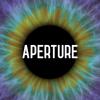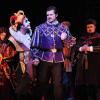
We usually encounter operas in full-blown splendor — big stage, large orchestra, lighting and costumes — and, of course, one opera in an evening — or on rare occasions, two. But last weekend, West Edge Opera’s annual Snapshot program introduced the public to five operas in one day, making for a stimulating laboratory showcase.
The operas, all either works-in-progress or brand-new scores, were presented anthology-style — that is, in excerpts — and as concert readings. The adept accompaniment was from the excellent new-music ensemble Earplay, led alternatively by conductor Mary Chun and by longtime West Edge luminary Jonathan Khuner. Video interviews with librettists and composers were projected before each excerpt, and a number of these creators were present.
The evening demonstrated no clear consensus on what constitutes opera today. The operas ranged widely in subject from historical to futuristic, and the music varied from lyrical to stridently modernist. Librettos were sometimes poetic and at other times starkly prosaic. Some were tinged with comedy, while others were fiercely confrontational.
For me, an old-school opera fan, atmosphere is key to reaching an audience’s collective imagination. If the music evokes a mood and develops the characters and the drama within that atmosphere, then opera can open doors for us into its strange and powerful abode.

Dreaming was the premise of composer Beth Ratay and librettist John Glore’s The Morpheus Quartet. The members of a string quartet, individually caught up in visions in the wee hours of the night, sing collectively in lively counterpoint. As the first violinist, soprano Winnie Nieh fearlessly flew through the stratospheric range.
Composer Byron Au Yong and playwright Christopher Chen’s Port City evoked two hardworking coders who follow their dreams, each creating an avatar who will do their work for them, apparently leaving the humans free to fall in love and enjoy life. Their musical-comedy-style romp seems to inspire the more robotic avatars as well, who remark how interesting it is to sing “through an algorithm.” ChatGPT users, take note.
The most evocative of these new works was L’autre moi (The other me) by composer Matthew Recio and librettist Stephanie Fleischmann. It is based on the French surrealist artist known as Claude Cahun (expressively sung by mezzo-soprano Em McAlister). In the excerpt we heard, Claude and her partner Marcel have left Paris in the early days of Nazi aggression to settle in Jersey, one of the Channel Islands. The music and lyrics beautifully — and rather dreamily — manifest the transformative nature of the ocean as Claude (whom her lover describes as a “shape-shifter”) contemplates this new-to-her seascape — a transformation that carried over into the dramatic scene that followed.

Composer Luna Pearl Woolf and librettist Andrea Michelle Stolowitz’s The Limit of the Sun hinges on a hostage situation, simultaneously presenting a captive with his handler, the captive’s mother across the world, and a government representative. In the first excerpt, parallel games of Scrabble evoked the tedium of waiting (“W-H-E-N?”). Mezzo-soprano Rachel Deatherage’s aria urging the mother to ransom her son was a model of spy-novel gov-speak, but the subsequent scene (in which the ransom goes disastrously wrong) suffered from the overwrought realism of the music.
Composer Shuying Li and librettist Julian Crouch’s When Purple Mountains Burn takes a historical approach to the appalling 1937 massacre at Nanjing, interlacing the memoirs of a Japanese soldier with the thoughts of historian Iris Chang, author of the real-life book The Rape of Nanking. The excerpts were disturbingly graphic; one hopes that the full-length version will include other tones as well.
While the singers’ diction was for the most part excellent, supertitles were still necessary. At the Berkeley performance on March 18, the screen was so low and off to the side that the titles were rather less than super — not to mention speckled with grammatical mistakes. The introductory videos gave interesting hints about the composition process but failed to give much orientation to the excerpts that followed.
In this year’s iteration, Snapshot again demonstrated the creative energy of today’s composers and librettists, as well as the enthusiasm of audiences for new opera (Saturday’s show at the Hillside Club played to a packed and appreciative crowd). And the ever-innovative West Edge Opera recently announced its 2023 summer festival, two full-length operas and a double bill of one-acts, upcoming in July and August at the Scottish Rite Center in Oakland.




